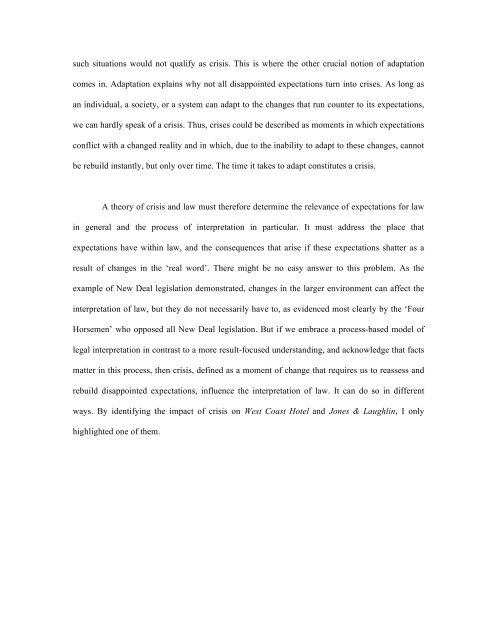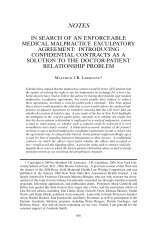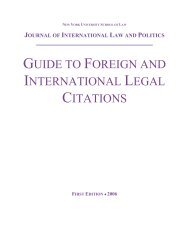Jasper Finke, Crisis and Law - New York University School of Law
Jasper Finke, Crisis and Law - New York University School of Law
Jasper Finke, Crisis and Law - New York University School of Law
Create successful ePaper yourself
Turn your PDF publications into a flip-book with our unique Google optimized e-Paper software.
such situations would not qualify as crisis. This is where the other crucial notion <strong>of</strong> adaptation<br />
comes in. Adaptation explains why not all disappointed expectations turn into crises. As long as<br />
an individual, a society, or a system can adapt to the changes that run counter to its expectations,<br />
we can hardly speak <strong>of</strong> a crisis. Thus, crises could be described as moments in which expectations<br />
conflict with a changed reality <strong>and</strong> in which, due to the inability to adapt to these changes, cannot<br />
be rebuild instantly, but only over time. The time it takes to adapt constitutes a crisis.<br />
A theory <strong>of</strong> crisis <strong>and</strong> law must therefore determine the relevance <strong>of</strong> expectations for law<br />
in general <strong>and</strong> the process <strong>of</strong> interpretation in particular. It must address the place that<br />
expectations have within law, <strong>and</strong> the consequences that arise if these expectations shatter as a<br />
result <strong>of</strong> changes in the ‘real word’. There might be no easy answer to this problem. As the<br />
example <strong>of</strong> <strong>New</strong> Deal legislation demonstrated, changes in the larger environment can affect the<br />
interpretation <strong>of</strong> law, but they do not necessarily have to, as evidenced most clearly by the ‘Four<br />
Horsemen’ who opposed all <strong>New</strong> Deal legislation. But if we embrace a process-based model <strong>of</strong><br />
legal interpretation in contrast to a more result-focused underst<strong>and</strong>ing, <strong>and</strong> acknowledge that facts<br />
matter in this process, then crisis, defined as a moment <strong>of</strong> change that requires us to reassess <strong>and</strong><br />
rebuild disappointed expectations, influence the interpretation <strong>of</strong> law. It can do so in different<br />
ways. By identifying the impact <strong>of</strong> crisis on West Coast Hotel <strong>and</strong> Jones & Laughlin, I only<br />
highlighted one <strong>of</strong> them.
















